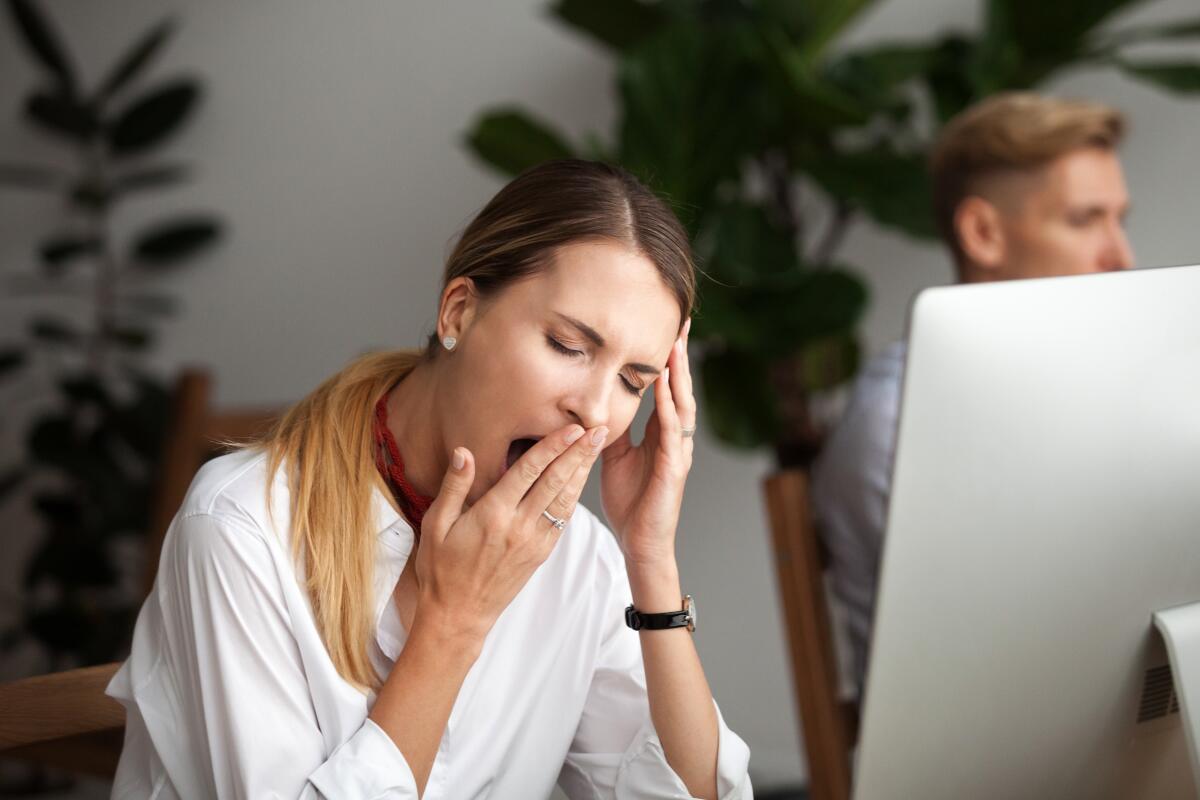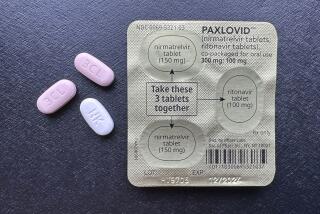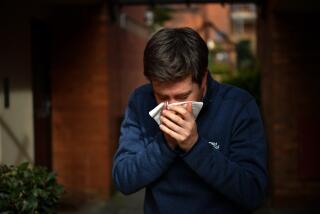Column: Thanks to the pandemic, we now also have ‘an epidemic of sleep deprivation’

- Share via
Having trouble sleeping? You’re not alone. Sleep disorders have grown so prevalent since the start of the pandemic, there’s a name for it — “coronasomnia.”
That got me wondering, as I yet again tossed and turned for much of the night, if this is going to have long-term consequences for society.
Simply put, is this the new normal? Are we now, thanks to the pandemic, a nation of lousy sleepers?
“I don’t think we’re forever doomed,” said Dr. Ronald Chervin, director of the Sleep Disorders Centers at the University of Michigan. “But I’d say we’re now in an epidemic of sleep deprivation.”
Every sleep expert I spoke with said things probably would get better when the COVID-19 pandemic finally eased. (Coronavirus cases have surged in recent days in Los Angeles County and throughout California.)
But each also acknowledged that, although many people may be sleeping just fine, millions of others, like me, can’t remember the last time they got a decent night’s shut-eye.
“We need to think about the epidemic of chronic insomnia that will follow the pandemic,” said Donn Posner, an adjunct clinical associate professor of psychiatry and behavioral sciences at Stanford University and head of the firm Sleepwell Consultants.
“Clearly this has been a stressful couple of years for a number of reasons — COVID, politics,” he told me. “Stress can lead to chronic insomnia, and chronic insomnia can take on a life of its own.”
A recent study by the American Academy of Sleep Medicine found that more than half of all Americans have had problems sleeping since the start of the pandemic.
The academy’s survey of about 2,000 U.S. adults determined that 56% were having trouble falling or staying asleep. Respondents also said that when they did manage to nod off, they tended to have “more disturbing” dreams.
These issues were most pronounced among people in the prime of life. Nearly three-quarters of respondents ages 35 to 44 reported suffering from coronasomnia.
Michael Perlis, director of the Behavioral Sleep Medicine Program at the University of Pennsylvania, said it was natural for people to sleep poorly amid heightened stress and anxiety.
“Evolution or God programmed us not to sleep when there’s a perceived threat,” he said. “If you have a lion looking at you and licking its lips, you shouldn’t go to sleep.”
COVID is that lion. You’re the prospective entree.
Even for those who are fully vaccinated, stress levels may be elevated because of work-related pressure, worries about family members or uncertainty about coronavirus variants.
Not surprisingly, the academy’s study found that many sleepless Americans had turned to prescription drugs or over-the-counter supplements such as melatonin to address their restlessness.
More than two-thirds of respondents said they were using such remedies more frequently since the pandemic started.
Americans spent more than $825 million on melatonin last year, up 43% from a year earlier, according to data analytics firm Nielsen.
Never one to miss a business opportunity, Amazon received federal approval on Friday to create sleep monitors that use “radar sensors” to track how much you toss and turn. Unlike the Apple Watch or FitBit, Amazon’s device wouldn’t be worn but would instead keep an eye on you from beside the bed.
U.S. adults were already sleep-challenged even before the arrival of Mean Mr. Corona. The ubiquity of cellphones, tablet computers and other buzzy distractions for years has undermined the ability of many people to catch some Zs.
The Centers for Disease Control and Prevention says that, prior to the pandemic, a third of U.S. adults weren’t getting the recommended seven or more hours of sleep each night.
Southern Californians have a particularly tough time nodding off, with as much as 37% of adults not getting at least seven hours of sleep, according to CDC data.
That’s only been exacerbated by the pandemic.
Jerome Siegel, director of UCLA’s Center for Sleep Research, told me the flexible hours that come with working from home had to some extent turned us into a nation of light sleepers.
“You can keep whatever hours you want, as long as you get your work done,” he said, observing that he now gets email from colleagues in the middle of the night.
“If things stay like this,” Siegel said, “then, yes, I can see how this would rewire people to develop new, possibly worse sleep habits over the long term.”
Other sleep mavens, while acknowledging things aren’t so great at the moment, say this too shall pass.
“From the earliest days of the pandemic, there has been a lot of fear,” said Dr. Atul Malhotra, a sleep expert at UC San Diego Health. “But I don’t think this will lead to permanent damage. I think things will get back to normal. Eventually.”
The trick, he and others say, is to undo the sleep sloppiness that’s taken root with remote work and schooling.
“During the pandemic, everyone became a night owl,” said Dr. Rajkumar Dasgupta, a sleep specialist at USC. “Good sleep is about structure. People are going to have to reset their circadian rhythms, which is not easy.”
The experts advise people to practice what’s known as good sleep hygiene. Some of this is common sense, such as avoiding caffeine, alcohol and nicotine before bed.
But as Dasgupta said, good sleep is about structure. That means mending your easygoing pandemic habits and reintroducing some discipline.
Here are some tips from the pros for better sleep:
- Get up at the same time every day. This is by far the most effective way of resetting your internal clock, although it can leave you groggy on days when sleep has been elusive.
- If you awaken frequently in the middle of the night, try going to bed later and thus squeezing the hours of sleep you do get into a continuous cycle.
- Maintain a no-gadgets rule for the bedroom. Sleep and intimacy. Nothing else.
- Go easy on the devices before bedtime. Anything that emits light or is stimulative in any way, including music, is going to perk you up.
- Avoid large meals and exercise before bedtime.
“And no napping,” said UCLA’s Siegel. “Napping is not something that healthy humans do. Hunters and gatherers didn’t nap.”
That may be the toughest one for me. I’ve been napping more often during the pandemic — mostly because I’m sleeping so poorly at night.
That will change, hopefully, when we all return to the office, at least part time, and start hunting and gathering again.
More to Read
Inside the business of entertainment
The Wide Shot brings you news, analysis and insights on everything from streaming wars to production — and what it all means for the future.
You may occasionally receive promotional content from the Los Angeles Times.











